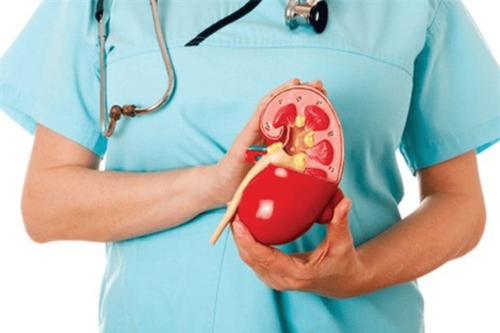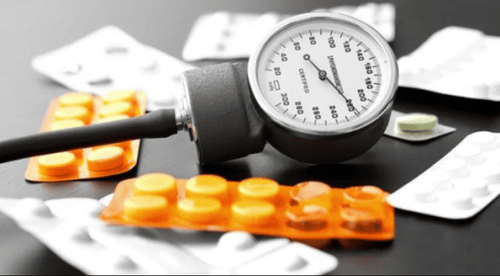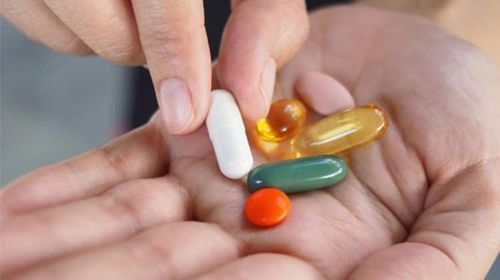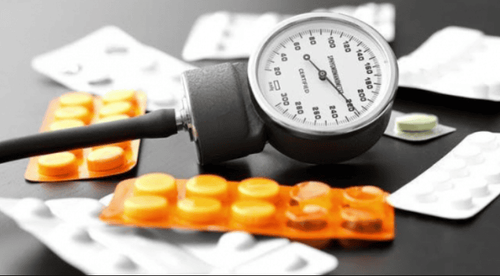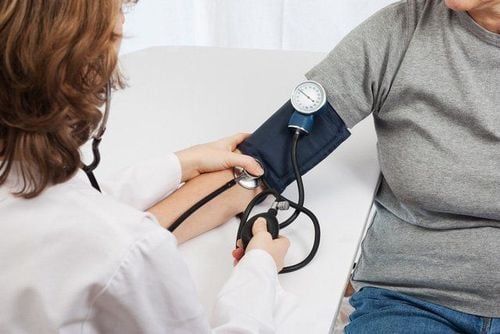This is an automatically translated article.
There are many risk factors for hypertension in CKD patients, such as: decreased sodium excretion, increased sympathetic activity, increased renin-angiotensin system (RAS) activity. ), increased synthesis of endothelin, imbalance of prostaglandins or kinins, increased synthesis and decreased nitric oxide.1. The link between hypertension and kidney failure
Hypertension occurs in 85-95% of patients with chronic kidney disease. Hypertension and chronic kidney disease are intrinsically interrelated. Specifically as follows:Approximately 23.3% of people with hypertension do not have chronic kidney disease About 35.8% of people with high blood pressure have stage 1 chronic kidney disease About 48.1% of people with high blood pressure have the disease Chronic kidney disease stage 2 About 59.9% of people with high blood pressure have stage 3, 4, and 5 chronic kidney disease People with prolonged high blood pressure will damage blood vessels and gradually destroy them, hindering the process. blood supply to all organs in the body, including the kidneys. High blood pressure also destroys the filters in the glomeruli, making it impossible for the kidneys to complete the function of filtering waste and excess waste out of the body. Uncontrolled excess water in the blood system is one of the causes of high blood pressure. These two conditions affect each other, complement each other, causing uncontrolled long-term hypertension that will lead to chronic kidney failure.
Besides, the kidneys have the function of keeping blood pressure stable. If the kidneys are damaged, blood pressure will also be affected, making it more difficult to regulate blood pressure. In patients with renal failure, hypertension aggravates the patient. Hypertension is considered one of the dangerous complications of chronic kidney disease.
Although hypertension can be effectively treated with medication, very few patients are able to achieve treatment goals. Many studies have shown that, now, blood pressure awareness has greatly improved, the rate of blood pressure control has increased by 50%.
2. Why do kidney diseases increase blood pressure?

Những khiếm khuyết vốn có ở thận là nền tảng gây nên tăng huyết áp
If the patient has dangerous manifestations due to hypertension, the number of nephrons is lower than the control group without hypertension on biopsy. The nature of kidney defects, especially those related to sodium excretion or mediating factors that increase subsequent peripheral resistance, is not really clear.
Volume overload in hypertensive patients with CKD has been demonstrated by the effectiveness of ultrafiltration or diuretics in controlling blood pressure in CKD patients. Short-term dialysis has shown that a small number of patients require blood pressure medication to control blood pressure.
2.3. Positive salt balance Positive salt balance is also one of the important factors causing hypertension in patients with chronic kidney disease. Many studies have shown that salt and water retention maintained by increased peripheral resistance can cause hypertension.
2.4. Activation of the renin-angiotensin system (RAS) A known risk factor for hypertension in patients with chronic kidney disease is activation of the renin-angiotensin system (RAS). Bilateral nephrectomy or RAS inhibition in dialysis patients whose blood pressure is difficult to control despite optimal ultrafiltration will provide effective blood pressure control. That said, kidney failure is the source of increased renin. In addition to the direct hypertensive effect, activation of the RAS system also contributes to hypertension in patients with chronic kidney disease due to stimulation of the sympathetic nervous system. Many studies have shown that patients with chronic kidney disease with increased sympathetic nerve activity can respond well to ACE inhibitors, bilateral nephrectomy. Even when renal function is preserved, RAS activation remains an important factor in hypertension in patients with renal disease.
2.5. Calcineurin inhibitors (tacrolimus and cyclosporine) and glucocorticoids Calcineurin inhibitors can cause vasoconstriction. In addition, renal artery stenosis of the transplanted kidney can also cause post-transplant hypertension.
3. How to avoid it

Hạn chế muối
Follow a healthy lifestyle There should be a scientific and appropriate menu for people with high blood pressure: Limit salt and saturated fats. Increase fruits and vegetables, high-fiber foods Increase exercise. You should exercise at least 30-45 minutes a day, 4-5 days a week Control your weight, body mass index Completely abstain from alcohol, beer, don't smoke, don't use addictive substances Get enough sleep reasonable rest. Hypertension and chronic kidney disease are interrelated. Patients with chronic kidney disease are at very high risk of developing high blood pressure. High blood pressure also affects the health of the kidneys, leading to many kidney and cardiovascular diseases. Therefore, to prevent complications and control blood pressure well, patients need to have regular health check-ups and blood pressure checks. Hypertension check-up is a routine activity at Vinmec International General Hospital, the blood pressure checkup package at Vinmec is carefully managed, providing effective treatment regimens for patients.
In addition, the Vinmec International General Hospital system also applies the technique of urine testing to assess kidney diseases. L-FABP technique allows early diagnosis of renal failure. Currently, Vinmec is the first hospital in Vietnam to apply this test according to Japanese technology on a modern automatic AU680 testing machine, giving quick and accurate results.
Patients can collect urine for testing at any time of the day, without fasting or complying with any strict requirements. The modern machinery system at Vinmec hospital will give accurate results within 30 minutes.
With a team of medical - doctors who are experts, highly qualified, dedicated and wholeheartedly for the benefit of the patient. With 90% holding university degrees, 20% are professors, associate professors, nearly 30% are doctorates, bringing high efficiency in medical examination and treatment; Comprehensive and professional medical examination, consultation and treatment services; System of modern equipment, supporting effective diagnosis and treatment; Modern, civilized, luxurious and sterile medical examination and treatment space....
Please dial HOTLINE for more information or register for an appointment HERE. Download MyVinmec app to make appointments faster and to manage your bookings easily.
The article references the source: Vietnam Cardiology Association



